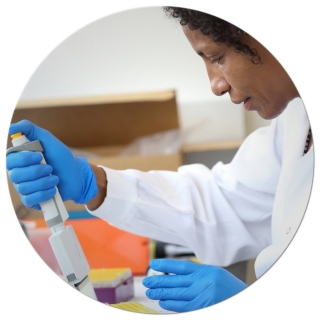 Advance Biomedical and Health Sciences for Healthy Populations
Advance Biomedical and Health Sciences for Healthy Populations
Building on a long history of outstanding contributions to health research, McGill is a world leader in translating discoveries from basic research in disease mechanisms at the molecular and cellular levels into improved clinical outcomes. We are focused on using basic and applied research to provide solutions for efficient and high-quality health care and rehabilitation for a diverse set of diseases and conditions.
These solutions range from advancing stem cell research, regenerative medicine and bioengineering (including tissue engineering and the use of nanomaterials in medicine) to the development of precision therapies, surgical innovations, and medical devices. A fundamental question rests at the heart of our work in these fields: “How can we best prevent and treat disease?” In response, we are developing new approaches to better understand and provide novel solutions, over the life course, to complex health problems, such as many types of cancer, infections and immunological disorders, cardiometabolic and musculoskeletal diseases, as well as rare and neglected diseases. Our multidisciplinary approach considers the intrinsic genetic determinants of human health while addressing how environmental and social factors influence individual and collective well-being.
The approach also recognizes that the burden of disease and poor health is most acute in vulnerable populations, and so McGill health researchers work with communities to understand and reduce health inequities in Quebec, Canada, and around the globe.
Genomic Medicine
Genomic medicine research at McGill harnesses unprecedented opportunities afforded by advances in genetics and genomics in order to find disease therapies that are targeted to individual patients. Advances in bioinformatics allow research in genomic medicine to improve diagnoses, interventions, and treatments for a wide range of conditions, including cancers, infection, neurological disorders, and chronic diseases of aging. Working together with genomics researchers at McGill are those advancing our understanding of the policy, legal, and ethical implications of the medical applications of genomics.
Human health and well-being
Human health and well-being is profoundly shaped by the physical and social environments where we live, work, study and play. Building on longstanding Canadian and Quebec leadership in population health and public health, McGill researchers work on better understanding the influence of indoor and outdoor air pollution on multiple health outcomes. They examine the role of the built environment and neighbourhood design to lower the population level burden of chronic disease, and seek to understand how socio-demographic changes like aging, immigration, and the increase in people living alone influence social connections, health, and well-being.
Cancers
The disease burden of all cancers remains high and is growing globally due to aging and to population increases. McGill cancer research priorities include identifying modifiable risk factors and overcoming drug resistance in metastatic disease, together with translating fundamental discoveries to expand the reach of cancer therapies. By integrating clinical, imaging, and laboratory test data with fundamental discovery, technology advancement, and outcomes research, McGill researchers develop patient-oriented and precision medicine-based strategies for hard-to-treat cancers.
Stem cell
Stem cell discoveries from the mid-20th century paved the way for a revolution in biomedical sciences. McGill researchers are working to improve our understanding of embryonic and adult stem cell biology and are establishing human stem cell banks from multiple diseases. McGill’s research expertise in clinical grade therapeutic cell production ensures our contribution to leading cellular processing technologies, fostering productive partnerships with private sector entities and ultimately delivering our biological therapeutics to Canadians and the international community.
Infectious and inflammatory diseases
Infectious and inflammatory diseases are global health challenges. McGill researchers work at the levels of molecules, cells, patients, and populations to discover new mechanisms underlying the development of infectious and inflammatory diseases. They advance novel diagnostics and therapies for these conditions and deliver solutions to the populations that need them the most. Areas of research span viral, bacterial, and fungal disease-burden around the world, and include hospital-acquired infections, antibiotic resistance, and auto-immune and inflammatory diseases.